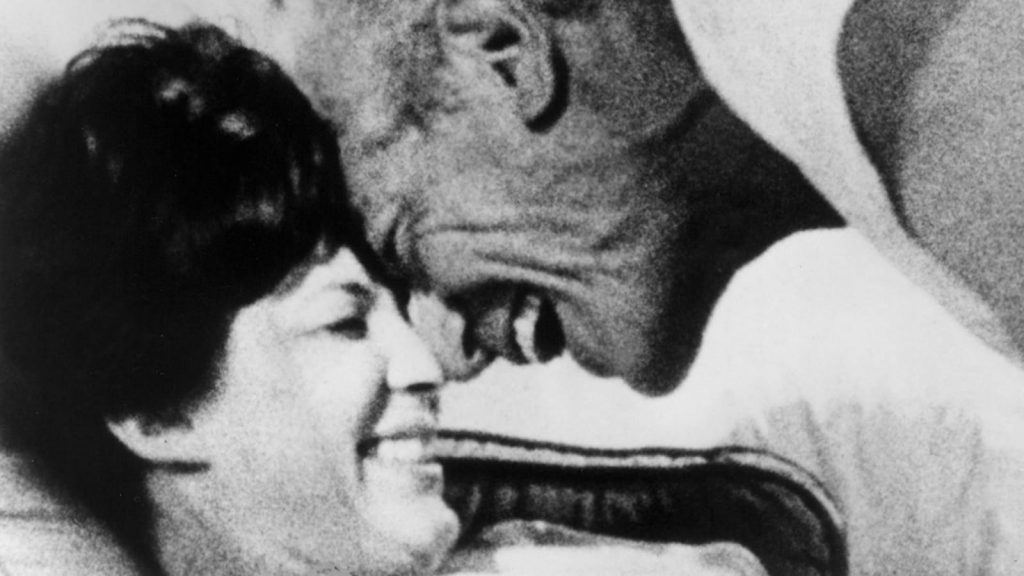Film Review: Faces (1968)



Faces can be tedious to watch at times. There aren’t very many scenes, and of these, they tend to go on and on a bit. Usually, movie scenes are direct and to the point. They offer us the information we need, and then they quickly move on to the next all-important plot point. Faces is a different animal. At times, it hardly feels like a movie at all, but closer to surveillance footage from the suburban living rooms of middle-aged couples who’ve had too much to drink. Scenes do not end when we’ve been given the pertinent story information. They end when they would naturally end in life: when they’re over. Sometimes they’re funny and loving, sometimes they’re mean, and sometimes they drag on with no end in sight (even though you desperately want the episode to be over). John Cassavetes, the director, has tapped into how life really moves, and how it can move right past you.

I am an admirer of Cassavetes. His work isn’t always the most technically sound, but I admire what he attempts. Out of the many self-indulgent, high concept, wannabe deep thinking directors (ones who claim to be after truth and meaning and so on), Cassavetes ranks among the sincerest in my opinion. He didn’t take much shit from anyone, and he worked his ass off to get his movies made. In short, he was a successful Hollywood actor, who was also an influential independent filmmaker who would hustle any way he could to get his films made. There’s an honesty about him that a lot of filmmakers could learn from.

Faces, his fourth film, is about the dissatisfaction that can come with the “American Dream.” Richard, or “Dickie” (John Marley), and Maria (Lynn Carlin) are a middle-aged couple whose marriage cannot go on any longer. Neither are happy, and their anger manifests in bouts of anger as they drink and smoke in their suburban home. After a declaration of divorce, Richard calls a prostitute he knows (Gena Rowlands, Cassavetes’ real-life wife) and heads over to her place. Maria winds up out at a nightclub with a group of friends, where they pick up a hippy/beatnik swinger type fella. It’s very Mad Men—a show heavily influenced by Cassavetes (Faces even features a character named Draper). I’m a big fan of the show too, in case you were wondering.

Every scene is filled to the brim with long conversations that pitch back and forth between merriment and open hostility. At times, I felt as if I was being held hostage in some of the tenser moments. It’s interesting that a small film like this—one about real life and real people—easily captures intensity better than most thrillers. What’s so thrilling about it, I suppose, is that it feels more natural. Real life is more relatable. Who would have guessed?

The acting is wonderful. Rowlands and Carlin are absolutely mesmerizing as the female leads. They are strong, yet sympathetic. Totally cool, quiet, and collected, yet vulnerable. This is in stark contrast to the brutish men in their lives, who are loud, brash, uncouth, and selfish. The men spend a lot of time hollering, while the women sit and take it with seeming subservience (their eyes tell a different story, however). The women may seem docile, but they’re anything but.

Shot on grainy film and edited in a choppy manner that could be considered amateurish by anyone not paying attention, Faces, like Cassavetes’ 1959 debut, Shadows, is the epitome of 1960s arthouse cool. It gets at truths better than most films and shines some light on bored, shallow suburbanites in the process. I’m not sure if we’re supposed to feel pity or contempt for these characters, but there’s no getting around feeling something about them. Are they tragic heroes or stuck-up socialites? That’s for you to decide, but they are something, and so is the film.
United States • 1968 • 130 minutes • Black & White • 1.66:1 • English • Spine #252
Criterion Special Features Include
- New, high-definition digital restoration, with newly restored uncompressed monaural soundtrack on the Blu-ray edition
- Alternate eighteen-minute opening sequence
- Episode of the French television series Cinéastes de notre temps from 1968, dedicated to director John Cassavetes
- Making “Faces”, a 2004 documentary featuring interviews with actors Seymour Cassel, Lynn Carlin, and Gena Rowlands and director of photography Al Ruban
- Al Ruban on Lighting and Shooting “Faces,” a new program featuring commentary by Ruban (Blu-ray); Lighting & Shooting the Film, a study of the techniques and equipment used on Faces by Al Ruban (DVD)
- English subtitles for the deaf and hard of hearing
- PLUS: A booklet featuring an essay by Stuart Klawans (DVD release)
